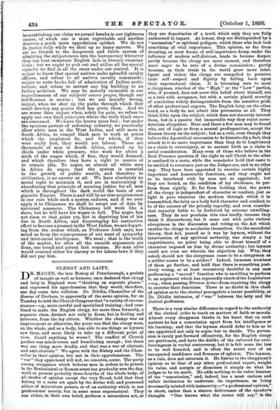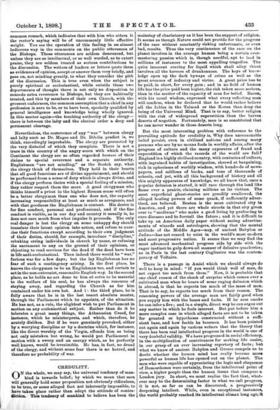CLERGY AND LAITY.
DR. MAGEE, the late Bishop of Peterborough, a prelate of insight as well as humour, once declared that clergy and laity in England were " thinking on separate planes," and expressed his apprehension that they would, therefore, one day come into collision. Dr. Dibdin, Chancellor of the diocese of Durham, is apparently of the same opinion, for on Tuesday he told the Church Congress that "a variety of circum- stances—e.g., more careful and specialised training—had com- bined to make the English clergy, far more than formerly, a separate class, distinct not only in dress, but in feeling and interests, from the lay citizen. Whether the change was an improvement or otherwise, the point was that the clergy were, on the whole, and as a body, less able to see things as laymen saw them, and more likely to take up a different point of view. Could anything be worse ? The conflict of Church parties was misch'evous and humiliating enough ; but there was one thing more deadly, and that was a war of clericals and anti-clericals." We agree with the Bishop and the Chan- cellor in their opinion, but not in their apprehensions. The "war" they apprehend will not, we conceive, occur. The party among clergymen which believes men in orders to be priests in the Brahminical or Roman sense has gradually won the day, until at present probably three-fourths of the whole body, of all shades of opinion except the very Broad, hold that they belong to a caste set apart by the divine will, and possessed either of miraculous powers, or of an authority which is not professional merely, but in some sense supernatural. They can either, in their own belief, perform a miraculous act, or
they are depositaries of a truth which only they are fully authorised to impart. At lowest, they are distinguished by a "succession," or spiritual pedigree, which those who lack lack something of vital importance. This opinion, so far from decaying, as most forme of self-importance decay, under the influence of modern self-distrust, tends to become deeper, partly because the clergy are more earnest, and therefore more eager to be sure of a divine commission ; partly because, as their rivals in the world grow more intel- ligent and richer, the clergy are compelled to preserve their self - respect and dignity by falling back upon
their supernatural claim. It is becoming rare to meet a clergyman, whether of the " High " or the " Low " parties, who, if pressed, does not avow this belief about himself, not as a rule with arrogance, but with a certain placid security of conviction widely distinguishable from the sensitive pride of other professional experts. The English laity, on the other hand, as a body do not admit this pretension at all. They think little upon the subject, which does not sincerely interest them, but in a passive but immovable way they reject sacer- dotalism altogether. Here and there a few men may be found who, out of logic or from a mental predisposition, accept the Roman theory on the subject ; but as a rule, even though they believe the Apostolical succession to be historically a fact, they attach to it no more importance than they do to Legitimacy as a claim to sovereignty, or to ancient birth as a claim to social consideration. Many even of those who believe in the Real Presence question if the right to call Christ to the altar is confined to a caste, while the remainder hold that caste to be entitled to reverence just as the Judges are, and in no other way. They have been appointed to exercise certain highly important and honourable functions, and they ought not to be interfered with by men not so appointed; but they are bound, as the condition of lay obedience, to per. form them rightly. So far from holding that the power of the clergy is independent of character or conduct, just as light is pure whatever the medium through which it is transmitted, the laity as a body hold character and conduct to be of the essence of the priestly capacity, and even consider that capacity liable to be forfeited by extreme unwilling- ness. They do not proclaim this view loudly, because they think it discourteous, but it came out with quite curious abruptness in the discussion and voting on the Act which enables the clergy to secularise themselves. On the sacerdotal theory, that Act, passed as it was by laymen, without the intervention of any spiritual authority, was simply a lay impertinence, no priest being able to divest himself of a character imposed on him by divine authority; but laymen could not even see wherein the objection lay. Why, they asked, should not the clergyman cease to be a clergyman as a soldier ceases to be a soldier? Indeed, immense numbers of them go further, and hold that there is something posi- tively wrong, or at least excessively doubtful in any man performing a " sacred" function who is unwilling to perform it, an argument which has repeatedly checked the Legislature —e.g., when passing Divorce Acts—from requiring the clergy to exercise their functions. There is no doubt in this clash of opinion as to the clerical prerogative a latent possibility, as Dr. Dibdin intimates, of " war " between the laity and the clerical profession.
There is a very similar difference in regard to the authority of the clerical order to teach on matters of faith or morals. Almost every clergyman thinks in his heart that on such matters he has a commission apart from his intelligence or his learning; and that the layman should defer to him as to one appointed not only to argue but to decide. The preten- sion is rarely put forward offensively, for the English clergy are gentlemen, and have the dislike of the cultured for over- bearingness in verbal controversy, but it is felt none the less to be well founded, and is often the secret root of an unexpected confidence and firmness of opinion. The layman, as a rule, does not entertain it. He listens to the clergyman's opinion as to that of any other professional expert, weighs its value, and accepts or dismisses it simply on what he judges to be its merit. He adds nothing to its value because of the " commission," and, indeed, has a most curious and unfair inclination to underrate its importance, as being necessarily tainted with insincerity,—" a professional opinion," in short, rather than a sincere deliverance of the speaker's. thought. " One knows what the rector will say," is the common remark, which indicates that with him who utters it the rector's saying will be of uncommonly little effective weight. You see the operation of this feeling in an almost ludicrous way in the comments on the public utterances of the Bishops. Those utterances are seldom denounced, but unless they are so intellectual, or so well worded, as to extort praise, they are seldom treated as serious contributions to the discussion. The writers of leaders or letters quote them as evidences of opinion, accept or answer them very briefly, and pass on, not minding greatly, to what they consider the pith of the discussion. This is true even when the subject is purely spiritual or ecclesiastical, while outside those two departments of thought there is not only no disposition to ooncede extra reverence to Bishops, but they are habitually treated, and this by members of their own Church, with the grossest unfairness, the common assumption that a chief in any profession is sure to be, or to have been, specially qualified by general intelligence and knowledge being wholly ignored. In this matter again—the teaching authority of the clergy— there is between the laity and the clerical order a deep and permanent cleavage.
Nevertheless, the occurrence of any " war " between clergy and laity such as Dr. Magee and Dr. Dibdin predict is, we think, exceedingly improbable. The clergy are protected by the very disbelief of which they complain. There is not a trace in this country of the angry scorn with which on the Continent the clergy are so often regarded because of their claims to special reverence and a separate authority. Englishmen "are not minding," as the Scotch say, what the clergy think of themselves. They hold in their hearts that all good functions are of divine appointment, and should be performed from a sense of duty which is always divine, and if the clergy perform theirs with a special feeling of a mission, they rather respect them the more. A good clergyman who thinks himself a priest in the highest Roman sense will often be a better clergyman than one who does not, the capacity increasing responsibility at least as much as arrogance, and with that goodness the Englishman is content. His desire is for fine conduct, personal and professional, and if the fine oonduot is visible, as in our day and country it usually is, he does not care much from what impulse it proceeds. The only real danger is lest the clergy on some unhappy day should translate their latent opinion into action, and refuse to exer- cise their functions except according to their own judgment of their duties, should, for example, introduce " discipline," rebuking erring individuals in church by name, or refusing the sacrament to any on the ground of their opinions, or objecting to read services for the dead if the dead have been in life anti-ecclesiastical. Then indeed there would be "war," furious war for a few days; but the lay Englishman has no fear of such a contingency arising. In the first place, he knows the clergyman to be an Englishman too, and certain to act in the non-extremist, reasonable English way. In the second place, as he holds no act done to him ab extra to be material to the welfare of his soul, he has always the resource of staying away, and regarding the Church as for him
contained under his own hat. And the third place, he is fatly aware that he is in the last resort absolute master, through the Parliament which he appoints, of the situation. He has not, as a rule, the slightest wish to put Parliament in motion on any ecclesiastical subject. Rather than do it he tolerates a great many things, the Athanasian Creed, for instance, which he misinterprets, and which, therefore, he acutely dislikes. But if he were genuinely provoked, either by a worrying discipline or by a doctrine which, for instance, like the direct worship of the Virgin, offends him as being not only mistaken but wrong, he would put Parliament in motion with a sweep and an energy which, as he perfectly well knows, would be irresistible. He has, in fact, no dread of the clergy, and without some fear there is no hatred, and therefore no probability of war.







































 Previous page
Previous page